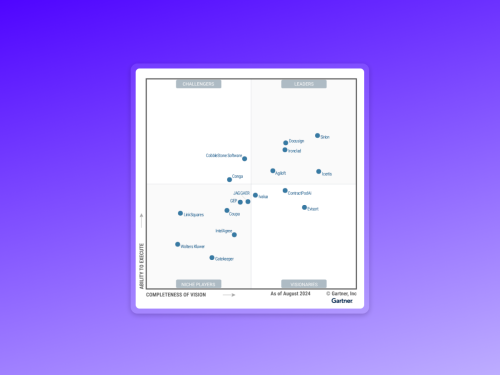
Good and bad retail: What we learned at the NRF Big Show 2019

By Phil Dawsey, Sr. Product Marketing Manager, Docusign
It’s been said that good retail is thriving, and bad retail is dying. 2018 certainly supported this maxim as retailers like Target and Walmart showed off the best results in a decade, while Sears and Mattress Firm went belly up. At Docusign, we felt the NRF show clarified our understanding of what separates a good and bad retailer in this fast-changing retail landscape. Six key themes stood out at the 2019 NRF Big Show:
Customer Experience Rules
The overriding theme of the conference was an obsessive focus on delivering a great customer experience. Expectations are higher than ever as consumers compare retailers to other experiences like those from Netflix or Airbnb. The focus has been on great omnichannel offerings as well as increasing store traffic since a large majority of sales are still made in brick and mortar locations. Physical stores are focusing on innovative service offerings ranging from Levi’s doing in-store embroidery to Marxent leveraging AR and VR technology to drive a 50-60% increase in average furniture order size. A consistent customer experience across channels is THE top focus of retailers for 2019.
Omnichannel is Now Table Stakes
Over the past few years, developing an omnichannel strategy has been a top priority for retailers, but now it seems like everyone has some form of multi-channel/omnichannel implemented. So why were there still so many packed sessions about this topic? Because it’s really complex and many retailers are having a hard time executing. The session Omnichannel Retailing: 9 ways to provide the experience your customers expect did a great job getting into the complexities and success drivers like a focus on back-end IT systems, breaking down data silos and having a great executive sponsor. Doing omnichannel well is the new imperative for retailers in 2019.
Back to Basics
Lowe’s CEO, Marvin Ellison stressed the importance of getting the basics right. Rather than venturing into flashy things like the smart home, he’s focusing modernization efforts on fundamentals like supply chain and core IT systems. This theme was echoed across retailers on stage and in the audience, who understand that to grow into new areas and win share, they need best-in-breed core systems to compete.
Breaking Silos to Enable Artificial Intelligence
Data is everywhere in retail these days, in fact it’s more valuable than gold. But data on its own isn’t worth much. Combining data across all the disparate systems retailers have implemented over the past several years is a big priority right now and many tech vendors were at NRF competing to deliver this service. As data silos are bridged, Artificial Intelligence (AI) will begin to take off. The retail industry invested $3.4 billion in AI in 2018 and that’s just the beginning. AI solutions were everywhere from product recommendations to personalized messaging to dynamic pricing. More data means a greater need for AI and we see this trend picking up steam this year.
Uncertain 2019
From the get-go, speakers like Chris Baldwin, NRF chairman and BJ’s Wholesale CEO, expressed cautious optimism but uncertainty about 2019. Janet Yellen, Former Fed Reserve Chair, noted that consumer spending fundamentals look excellent with good job growth and wage growth around 3%. But she also cautioned about the trade war brewing between the US and China, Brexit, and politics in a state of flux around the world. All this makes 2019 a year of uncertainty for retailers.
Mission is King
CEOs of Kroger, Dick’s Sporting Goods, Best Buy and Levi’s took the stage to discuss the importance of company conscience, from ending food waste to halting certain firearm sales. This isn’t just retailers acting as good citizens though, it’s good for business and loyalty as well. “Most of our customers do not come in for sustainable,” said Amy Hall, Director of Social Consciousness at Eileen Fisher. “They are looking for style. But when they find out that there is a cool value behind, such as fair trade, it makes them feel much better about the purchase and they attach to the brand.” No retailer should be without a mission these days!
These trends gave us at Docusign a sense of what retailers are thinking about in 2019. Given the pressure on the industry to digitize, the range of systems and solutions available, and the number of vendors offering each solution, we see the greatest challenge for retailers being prioritization. Our discussions throughout the show made it clear that retailers are struggling to decide which initiatives to invest in and, once prioritized, which vendor to go with. The decisions made at the top will define which retailers succeed and which fall short.
One area that we are convinced of is that core back-end systems are more important at this point in retail’s digital transformation than flashy gadgets. Contracting is one overlooked core process that is everywhere in retail from consumer sales contracts to vendor agreements to onboarding documents for employees that is in dire need of an update. Docusign’s System of Agreement platform modernizes this process, enabling retailers to streamline operations and deliver a better customer experience. T-Mobile was able to increase in-store sales conversions by 20% and Yamaha reduced errors in dealer contract from 70% to zero with Docusign. It’s a low risk, high reward initiative that should be prioritized as a quick win for many retailers. Give it a try for free.
There is, however, no one size fits all. The NRF Big Show gives us a glimpse at what’s possible, and good retailers will have to chart their own course and decide what’s right for them.
Related posts
Discover what's new with Docusign IAM or start with eSignature for free


